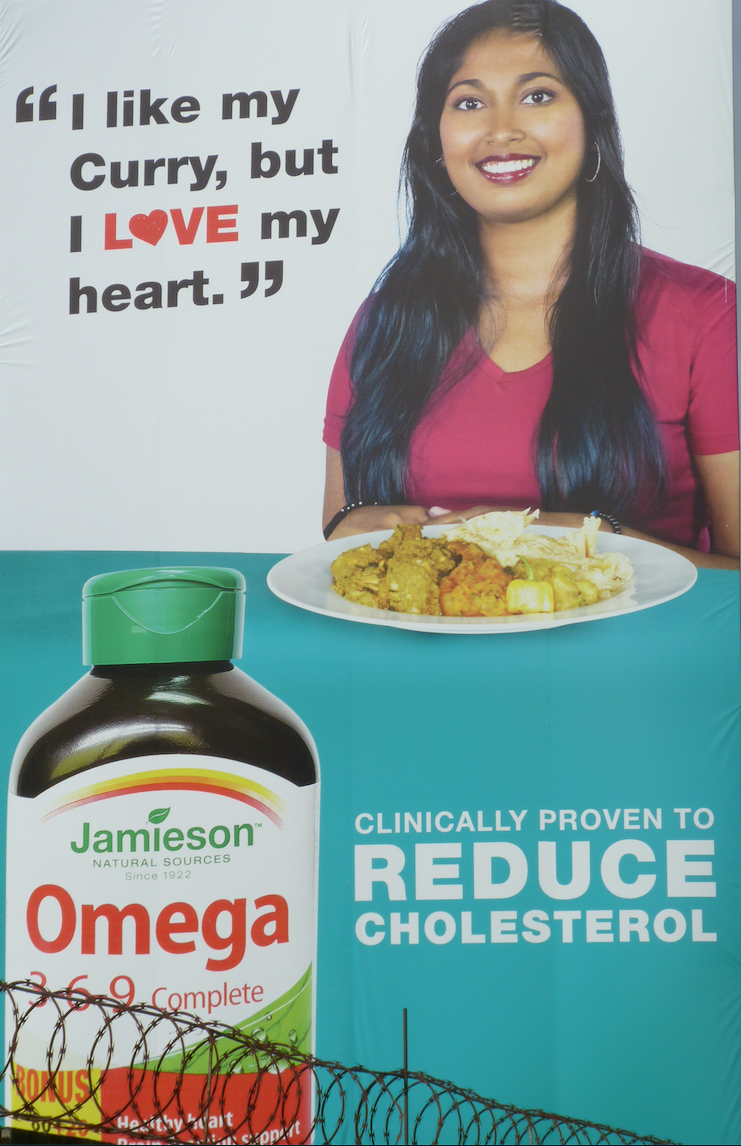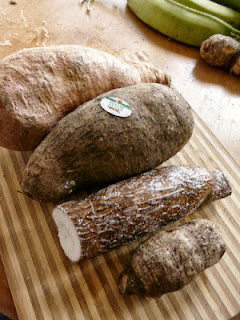Trinidad Omega Oil and Curry Controversy
One Caribbean Nation.



THAT OFFENSIVE OMEGA CURRY ADVERTISEMENT


Submitted by Dr Kumar Mahabir
The Omega 3-6-9 Complex advertisement on the nation’s highways – and now on TV – is an out-of-place, outright attack on all curry consumers. Indeed, it is an ethnic form of aggression on a group of people in multi-culinary Trinidad and Tobago.
This billboard advertisement suddenly appeared at various points on the highways with the tagline: “I like my Curry, but I love my heart.” The product being advertised is the Jamieson’s brand of Omega 3-6-9 Complex. The caption is followed by additional texts claiming that the tablets have been “Clinically proven to REDUCE Cholesterol.”
The caption is accompanied by an Indian woman with two tresses of long, flowing, black hair. She is serving a plate of paratha “buss-up-shut” roti with pumpkin, curried channa and aloo, curried chataigne [breadnut] and curried mango.
The public should be warned that the claim about the unhealthy effects of curry in this advertisement is false, unscientific and misleading. The advertisement should be immediately removed with an apology made to all curry consumers and educated people.
Curry powder is made from a blend of natural spices such as coriander, turmeric (“saffron”), ginger, cumin, fenugreek, nutmeg, fennel, cloves, tamarind, cinnamon, cardamom, chili peppers and curry leaves. On the other hand, Omega 3-6-9 is made from chemicals manufactured from fatty acids and fish oil and coated with gelatin sourced from beef and sometimes pork.
Gelatin is generally a faintly yellow, nearly transparent, glutinous substance obtained by boiling the skin, bones and ligaments of animals to form a glue. Vegetarians, Hindus and Muslims, therefore, should not be consuming Omega 3-6-9.

“The Omega 3-6-9 Complex advertisement on the nation’s highways…”
The clinically-proven medicinal benefits of curry
Contrary to the claims of the Omega advertisement, consuming curried foods have been clinically proven to lower the levels of “bad” cholesterol (LDL), thereby reducing the risk of coronary heart disease (CHD) and strokes.
A review of the potential medicinal benefits of murraya koenigii (curry leaves) in dyslipidemia was done by Mamta Parnami and Dr Kanika Varma of the University of Rajasthan in India. Their review was published in the International Journal of Advanced Scientific Research and Management (2018).
Dyslipidemia is defined as an elevation of the total cholesterol, the “bad” low-density lipoprotein (LDL) cholesterol and the triglyceride concentrations, and a decrease in the “good” high-density lipoprotein (HDL) cholesterol concentration in the blood. Dyslipidemia is an important risk factor for coronary heart disease (CHD) and stroke.
The researchers from the University of Rajasthan reviewed studies on the medicinal benefits of curry leaves on human experimental models. In one study, 38 persons were given a preparation of fine ground curry leaves twice daily, at a dose of 3 grams per meal for a period of 5 weeks. The study revealed a significant decline in total cholesterol (P=0.03).
Parnami and Varma also reviewed another study in which 40 post-menopausal women 45-65 years of age, with hyperlipidemia, were given with dried curry leaf powder (5gms) added to their main side dish during lunch for 45 consecutive days. At the end of the experimental period, there was a decrease of about 31.4 mg/dl TC, 15.9mg/dl TG, 23.8 mg/dl of the “bad” low-density lipoprotein (LDL) cholesterol. It was also observed that there was an increase of 6.5 mg/dl in the “good” high-density lipoprotein (HDL) cholesterol concentration in the blood.
The clinical claims of Omega 3-6-9 are misleading
The advertisement promotes the idea that Omega 3-6-9 is “Clinically proven to REDUCE Cholesterol.” Omega 3 is composed of polyunsaturated fatty acids found mainly in fish, fish oils, flax seed oil, green leafy vegetables, some nuts and vegetable oils.
Clinical research does not support the claim that omega−3 fatty acid supplementation prevents cardiovascular disease (including myocardial infarction and sudden cardiac death) and strokes.
These discoveries were published in Journal of the American Medical Association (JAMA) (2012), Archives of Internal Medicine(2012), Pharmacology & Therapeutics (2013), and Cochrane Database of Systematic Reviews (2018).
Omega-6 fatty acids are a family of polyunsaturated fatty acids found in foods such as poultry, eggs, nuts, whole-grain breads and most vegetable oils
A meta-analysis of 10 trials was done on 77,917 patients and published in JAMA Cardiology (2017). The study found no clinical support for the claim that the daily intake of one gram of omega-3 fatty acid in individuals with a history of coronary heart disease prevents fatal coronary heart disease, nonfatal myocardial infarction or any other vascular disorder.
Omega-9 fatty acids are a family of unsaturated fatty acids found in animal fat, vegetable oils and natural foods such as nuts, seeds and avocados.
Clinical evidence suggests that increasing omega-6 fats have little or no difference to triglycerides, high-density lipoprotein (HDL, the “good” cholesterol) or low-density lipoprotein (LDL, the “bad” cholesterol) (Cochrane 2018).
Research also conducted by L. Al-Khudairy et al. (2015) from Warwick Medical School concludes with this statement: “Our analyses found no statistically significant effects of either increased or decreased omega 6 intake on cardiovascular disease (CVD) risk factors.”
Dr. Mahabir obtained his Ph.D. in Medical Anthropology from the University of Florida.
Reblogged from Barbados Underground



Comments